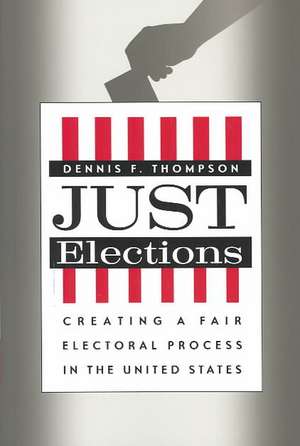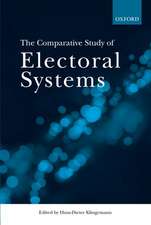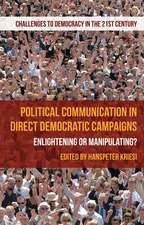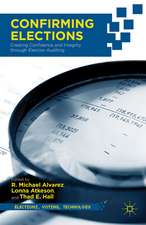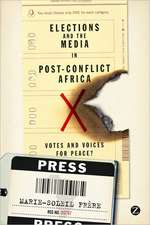Just Elections: Creating a Fair Electoral Process in the United States
Autor Dennis F. Thompsonen Limba Engleză Paperback – 9 sep 2004
The 2000 election showed that the mechanics of voting such as ballot design, can make a critical difference in the accuracy and fairness of our elections. But as Dennis F. Thompson shows, even more fundamental issues must be addressed to insure that our electoral system is just.
Thompson argues that three central democratic principles—equal respect, free choice, and popular sovereignty—underlie our electoral institutions, and should inform any assessment of the justice of elections. Although we may all endorse these principles in theory, Thompson shows that in practice we disagree about their meaning and application. He shows how they create conflicts among basic values across a broad spectrum of electoral controversies, from disagreements about term limits and primaries to disputes about recounts and presidential electors.
To create a fair electoral system, Thompson argues, we must deliberate together about these principles and take greater control of the procedures that govern our elections. He demonstrates how applying the principles of justice to electoral practices can help us answer questions that our electoral system poses: Should race count in redistricting? Should the media call elections before the polls close? How should we limit the power of money in elections?
Accessible and wide ranging, Just Elections masterfully weaves together the philosophical, legal, and political aspects of the electoral process. Anyone who wants to understand the deeper issues at stake in American elections and the consequences that follow them will need to read it.
In answering these and other questions, Thompson examines the arguments that citizens and their representatives actually use in political forums, congressional debates and hearings, state legislative proceedings, and meetings of commissions and local councils. In addition, the book draws on a broad range of literature: democratic theory, including writings by Madison, Hamilton, and Tocqueville, and contemporary philosophers, as well as recent studies in political science, and work in election law.
Thompson argues that three central democratic principles—equal respect, free choice, and popular sovereignty—underlie our electoral institutions, and should inform any assessment of the justice of elections. Although we may all endorse these principles in theory, Thompson shows that in practice we disagree about their meaning and application. He shows how they create conflicts among basic values across a broad spectrum of electoral controversies, from disagreements about term limits and primaries to disputes about recounts and presidential electors.
To create a fair electoral system, Thompson argues, we must deliberate together about these principles and take greater control of the procedures that govern our elections. He demonstrates how applying the principles of justice to electoral practices can help us answer questions that our electoral system poses: Should race count in redistricting? Should the media call elections before the polls close? How should we limit the power of money in elections?
Accessible and wide ranging, Just Elections masterfully weaves together the philosophical, legal, and political aspects of the electoral process. Anyone who wants to understand the deeper issues at stake in American elections and the consequences that follow them will need to read it.
In answering these and other questions, Thompson examines the arguments that citizens and their representatives actually use in political forums, congressional debates and hearings, state legislative proceedings, and meetings of commissions and local councils. In addition, the book draws on a broad range of literature: democratic theory, including writings by Madison, Hamilton, and Tocqueville, and contemporary philosophers, as well as recent studies in political science, and work in election law.
Preț: 239.65 lei
Nou
Puncte Express: 359
Preț estimativ în valută:
45.86€ • 47.61$ • 38.24£
45.86€ • 47.61$ • 38.24£
Carte tipărită la comandă
Livrare economică 25 martie-08 aprilie
Preluare comenzi: 021 569.72.76
Specificații
ISBN-13: 9780226797649
ISBN-10: 0226797643
Pagini: 269
Dimensiuni: 152 x 229 x 18 mm
Greutate: 0.43 kg
Ediția:1
Editura: University of Chicago Press
Colecția University of Chicago Press
ISBN-10: 0226797643
Pagini: 269
Dimensiuni: 152 x 229 x 18 mm
Greutate: 0.43 kg
Ediția:1
Editura: University of Chicago Press
Colecția University of Chicago Press
Notă biografică
Dennis F. Thompson is the Alfred North Whitehead Professor of Political Philosophy and director of the Center for Ethics and the Professions at Harvard University. He is the author of Political Ethics and Public Office, Ethics in Congress, and (with Amy Gutmann) Democracy and Disagreement.
Cuprins
Preface
Acknowledgments
Introduction: Electoral Justice
Legitimacy
Individual Rights
Fair Competition
Principles of Electoral Justice
Deliberating about Electoral Justice
1. Equal Respect: Why Votes Count
Casting Votes
Drawing Districts
Counting Votes
Conclusion
2. Free Choice: How Voters Decide
Selecting Candidates
Informing Voters
Financing Campaigns
Conclusion
3. Popular Sovereignty: Who Decides What Votes Count
Taking Initiatives
Deferring to State Legislatures
Empowering Commissions
Conclusion
Conclusion: Electoral Deliberation
Justice and Representation
From Principles to Institutions
Norms of Electoral Deliberation
Forums of Deliberation
Notes
Index
Acknowledgments
Introduction: Electoral Justice
Legitimacy
Individual Rights
Fair Competition
Principles of Electoral Justice
Deliberating about Electoral Justice
1. Equal Respect: Why Votes Count
Casting Votes
Drawing Districts
Counting Votes
Conclusion
2. Free Choice: How Voters Decide
Selecting Candidates
Informing Voters
Financing Campaigns
Conclusion
3. Popular Sovereignty: Who Decides What Votes Count
Taking Initiatives
Deferring to State Legislatures
Empowering Commissions
Conclusion
Conclusion: Electoral Deliberation
Justice and Representation
From Principles to Institutions
Norms of Electoral Deliberation
Forums of Deliberation
Notes
Index
